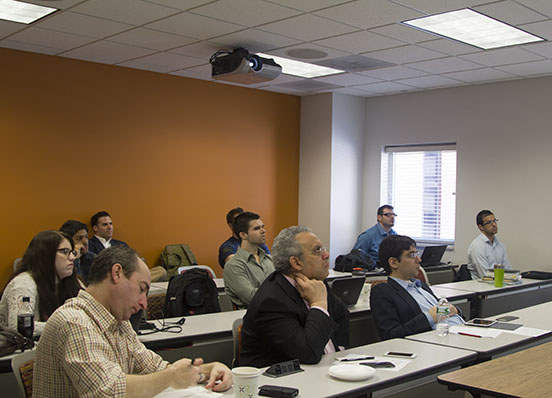Students in the new Legal Decision Technology class unveiled apps on April 22 that could answer an array of legal of problems like helping inventors decide if their creations are patent-worthy, ensuring that pharmaceutical companies are complying with federal regulations and providing clear bail guidelines to harried judicial court clerks.
The students showcased their app concepts during a competition that was the culminating activity in the course, which explored the ways that software can be used to encode law, analyze facts and expand public access to legal information, much like Turbotax makes the tax code digestible.
“We’re taking law and making it computational,” said Professor Michael Poulshock. “By building apps, students are seeing how the law can be baked into software that consumers or practitioners can use to get answers to specific legal questions.”
The class also explored a wide range of ethical, social and economic issues associated with legal technology, Poulshock said.
A member of the adjunct faculty, Poulshock was dubbed a “Legal Rebel” by the ABA Journal in 2013, based on his accomplishments building computerized knowledge systems like the Hammurabi Project, which is gradually making large bodies of law and regulation accessible and understandable to lawyers and lay people alike.
The competition, which unfolded in the midst of Philly Tech Week, was judged by Benjamin Martin, an independent brand consultant, Adel Ebeid, chief innovation officer for the City of Philadelphia and Constantinos Rokas, an attorney and IT developer.

Each student presented an app designed using Oracle Policy Automation:
- 3L Rachel Rutter, winner of the competition, presented an app that would help undocumented immigrants determine if they’re eligible to remain in the country under the Deferred Action for Childhood Arrivals policy.
- 2L Jean Infanti, runner up, presented an app that would help consumers determine if they qualify for veterans' benefits
- 3L Katherine Constantine presented an app that would provide clear bail guidelines for judicial clerks and municipal court judges
- 3L Brice Freyer presented an app that would help gun owners determine if permitting rules will adversely affect them if they travel out-of-state
- 2L Daniel Harryman presented an app that would make it easier to register for federal copyright protection to safeguard one’s intellectual property
- 2L Michael Martinelli presented an app that would help attorneys and compliance officers ensure that pharmaceutical and medical device companies are adhering to regulatory requirements under the Affordable Care Act
- 2L Hunter Morris presented an app that would help inventors determine if their innovations are patent-worthy
The course and competition are the most recent additions to an increasingly robust portion of the law school curriculum that is enabling students to master technology in both the substance and process of legal practice, said Daniel Filler, senior associate dean for academic and faculty affairs.
“Lawyers today must be extremely sophisticated, understanding many legal issues that arise through society’s increased reliance on technology, but they also must be able to adapt as technology reshapes the day to day practice of law,” Filler said, noting that e-discovery, for one, has reshaped legal practice and forced practitioners to develop expertise in sophisticated software systems.
The school’s expanded curricular offerings make it the strongest in the region for giving students a strong foundation in both the law in technology and technology in legal practice, Filler said, adding that the law school is fortunate to have a rich array of experts in both arenas on the faculty.
The school’s course offerings include:
- Advanced Trial Advocacy: Litigation Technology, taught by Professor Gwen Roseman Stern, director of the Trial Advocacy Program and a seasoned personal-injury litigator
- Cybersecurity Law, taught by Adjunct Professor Odia Kagan, a technology transactions, privacy and data security attorney in Pepper Hamilton’s Corporate and Securities practice group
- E-Discovery, taught by Adjunct Professor Michael Murphy, a member of Blank Rome’s Cybersecurity and Data Privacy client services group
- E-Commerce, taught by Trustee Professor Amy Boss, one of the nation’s leading authorities on the topic and the first professor and just the second woman to chair the ABA’s Business Law Section
- Information Privacy, taught by Professor Anil Kalhan, an authority on the Fourth Amendment who explores topics such as NSA surveillance and data searches by police
- Media Law, taught by Professor Chapin Cimino, an expert on the First Amendment who covers case law and current events related to the regulation of contemporary media
- Technology and Legal Practice, taught by Adjunct Professor Peter McCain, founder of e3 Discovery Consultants and a veteran e-discovery attorney
“Many law firms find themselves paying lavish consultants’ fees for the kinds of insights about legal technology that our graduates will be able to bring to the job on day one,” Filler said. “What we’re doing will benefit our students and their future employers equally well.”